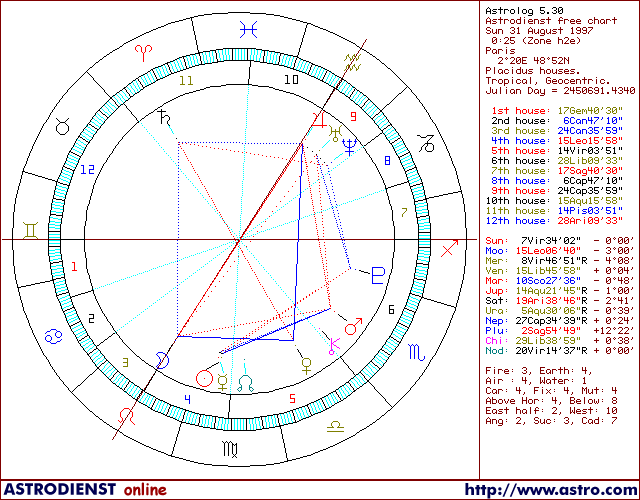Death of Princess Diana
Primary Transcendental Neptune, Secondary Mercury, Tertiary Transcendental Uranus.
Aug 31, 1997
00.25.00 AM CED (-02)
Paris
2E20'00"; 48N52'00"
Asc: 17Ge40; Mc: 15Aq16
Source: The Times (UK), September 1. (This study is based on the moment of the fatal crash and not for the time of the official announcement of her death, which was made at 4 am, Paris time; 2 am GMT.)
Commentary: Of interest here is, firstly, the international outpouring of both "sympathy and empathy,"* particularly among women, for Lady Di at the moment of her death; and we see here that the planet ruling such values -- Neptune -- was indeed the least-aspected or Transcendental Planet at that tragic moment. Of particular note: Neptune was a "triple-zero" Transcendental: with no major, minor or asc / mc aspects (000). (Neither does Neptune make aspects to certain other notable points, such as the Node, the Vertex, or the Equatorial Ascendant.) Along with the other two-least aspected planets, Mercury and Uranus, we have the rather startling portrait: "A global outpouring of empathy / due to an accident or unforeseen set of circumstances / which occurred during travel or in a vehicle of travel" (Neptune / Uranus / Mercury).
The portrait becomes more intriguing when we study the houses in which each Transcendental Planet resides: Neptune and Uranus in the 9th house of travel to foreign lands; and Mercury in the 4th, which rules the homeland as well as burial, and the question of the personal soul. Here we have Mercury which rules journalism and the press, as well as the overall communication of ideas. (Others have also assigned the rulership of the "common people" to this planet.)
With Neptune in the 9th we can thus speak of "an international outpouring of empathy"; as well, it would be correct to imagine that something of the "world-soul" is touched upon here in a very direct manner; one affecting the hearts and souls of people regardless of national affinity. (Neptune is also the anima-mundi or 'world-soul'.) Besides the notion of "an accident or unexpected hazard in a foreign land" (Tr.-Uranus - 9th); Uranus points to something else, as well: the telic nature of this event is reflected through the presence of Uranus: With her unforeseen demise, the "future personality" (Uranus) of Diana came immediately to the fore. Who she really was, or strived to be, was this humanitarian figure. In her birth chart, Jupiter, which rules "humanitarian work," was her least-aspected or Primary Transcendental Planet. With her death, her future role (Uranus) -- the one we imagine now when we think of her, but one which was at previous times obscured by the scandals and personal problems of her life -- came immediately into focus: For the first time, people even thought of her as a saint! In fact, the Church of England even felt obliged to advise the public that while Diana did perform good works, she was not in fact a modern goddess. (Regardless of the advice of these old Church "Fathers," her worship to this day continues.)*
Uranus it should also be noted rules the sudden reversal of positions; I have previously identified it with the "enantiodromian function" [Jung] in the psyche. In other words, when a position of one extreme or opposite is achieved, there may suddenly be a reversal into the other extreme position or form (e.g., the coup d'etat; the political "swings" from party to party; the sudden shifts in fashion, taste, mental attitude, etc.). With the death of Lady Di (I prefer to call her Princess Diana: after all, once a princess, always a princess, no matter what that frowsty old queen may think), there was indeed this sudden leap, not only into the future personality, but into the perspective of Diana as no longer touched by scandal but instead as somehow "godly." Who knows what a future enantiodromia may bring: we may not always remember her as such. Yet with her sudden death, Transcendental Uranus did indeed quickly enforce this dynamic reversal into the future condition. Enantiodromia is not merely a reversal or seesaw like up-and-down motion: it does indeed move forward telically; that is the whole point of achieving such reversals in the first place: a reformation is gained, another future step taken. With Di's Transcendental Uranian moment of death, this realization was our realization: It struck home with such force and power globally for the very first time: "Yes, indeed, in her acts, there was something saintly, something beyond merely human, something that transcended the ordinary human tale." It is that and that alone that has led me to speak of transcendental energies, transcendental powers and personalities: That which is evidence of more than we ordinarily, or humanly, imagine. "What a piece of work is man / how noble in reason." As I mentioned above, with Mercury placed in the fourth, we are left to ponder the role it plays here in reflecting not only the "travel" characteristic as a Transcendental element in this moment in time but, too, the role of the "pursuing journalists" at home -- which led indeed to the pursuits and fiascoes abroad. The role of journalism, both as a factor in her death and in England itself was hotly debated in the months following her death; as was the "future role / of journalism / in Britain" (Tr. Uranus / Tr. Mercury / Mercury 4th). As Linda Reid has written, "the fourth house is the ultimate place of safety, an allegorical womb to which one can withdraw for periodic sustenance,"* yet the British journalists and their non-stop feeding frenzy for any tidbit of "Lady Di" left her largely unable to secure such sustenance in any easy manner; indeed, as ruler of "conditions at the end of life" and "the grave," we might even say, rather chillingly, that they, "the media, / entombed her" (Tr. Mercury / 4th).
Notes:
* "She was mourned by more than a million people in central London who lined the route of her funeral procesion; by the 2,000 mourners inside Westminister Abbey who had been invited to attend her funeral service. Tens of thousands more gathered along roadsides to say farewell as she was driven roughly 70 miles northwest of London to Althorp, her family's ancestral home. And across the earth's 24 time zones, hundreds of millions interrupted their waking or sleeping schedules to gather around television sets." "Farewell, Diana," Time magazine, September 15, 1997, pp. 29-30.
* Nicholas Campion, in his recent essay on Princess Diana, puts it quite well I think -- and into the proper archetypal perspective -- when he asks: "Was Diana a saint? I would say yes, and I called her such from the moment when she began her visits to AIDS patients and lepers. But the affirmative answer is based as much upon projection of public hopes and expectations on to her as to her nature. It was not that her nature was saintly that enables her to be perceived as such, but that she became such a powerful vehicle for those public projections. It seemed to me that from that moment she took on the archetype of one of those Anglo-Saxon princesses who died young and whose shrines became healing sanctuaries." "Diana, Princess of Wales," The Astrological Journal, Nov/Dec 1997, Vol. 39, No. 5.
* Linda Reid, "Crossing the Threshold: The Astrology of Dreaming." (Penguin / Arkana: London, 1997), p. 109.



